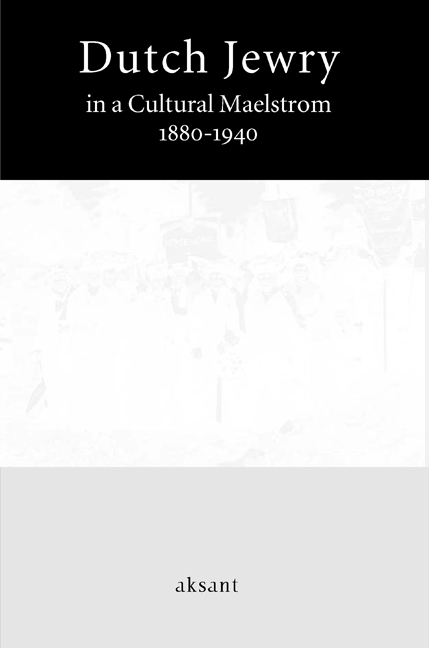Book contents
- Frontmatter
- Contents
- Foreword
- The New “Mosaik”: Jews and European Culture, 1750-1940
- The Politics of Jewish Historiography
- “The First Shall be the Last”: The Rise and Development of Modern Jewish Historiography in the Netherlands Until 1940
- Epigones and Identity: Jewish Scholarship in the Netherlands, 1850-1940
- Judaism on Display: The Origins of Amsterdam's Jewish Historical Museum
- De Vrijdagavond as a Mirror of Dutch Jewry in the Interbellum, 1924-1932
- “Holland is a Country which Provokes Serious Reflection…”: Images of Dutch Jewry in the German Jewish Press
- Spinozism and Dutch Jewry between 1880 and 1940
- Spinoza's Popularity in Perspective: A Dutch-German Comparison
- Mozes Salomon Polak: Jewish “Lerner” and Propagator of Freemasonry, Spiritualism, and Theosophy
- Jewish Women, Philanthropy, and Modernization: The Changing Roles of Jewish Women in Modern Europe, 1850-1939
- Roosje Vos, Sani Prijes, Alida de Jong, and the others: Jewish Women Workers and the Labor Movement as a Vehicle on the Road to Modernity
- Stemming the Current: Dutch Jewish Women and the First Feminist Movement
- Dutch Jewish Women: Integration and Modernity
- Index of Names of Persons
- Index of Subjects
Foreword
Published online by Cambridge University Press: 26 January 2021
- Frontmatter
- Contents
- Foreword
- The New “Mosaik”: Jews and European Culture, 1750-1940
- The Politics of Jewish Historiography
- “The First Shall be the Last”: The Rise and Development of Modern Jewish Historiography in the Netherlands Until 1940
- Epigones and Identity: Jewish Scholarship in the Netherlands, 1850-1940
- Judaism on Display: The Origins of Amsterdam's Jewish Historical Museum
- De Vrijdagavond as a Mirror of Dutch Jewry in the Interbellum, 1924-1932
- “Holland is a Country which Provokes Serious Reflection…”: Images of Dutch Jewry in the German Jewish Press
- Spinozism and Dutch Jewry between 1880 and 1940
- Spinoza's Popularity in Perspective: A Dutch-German Comparison
- Mozes Salomon Polak: Jewish “Lerner” and Propagator of Freemasonry, Spiritualism, and Theosophy
- Jewish Women, Philanthropy, and Modernization: The Changing Roles of Jewish Women in Modern Europe, 1850-1939
- Roosje Vos, Sani Prijes, Alida de Jong, and the others: Jewish Women Workers and the Labor Movement as a Vehicle on the Road to Modernity
- Stemming the Current: Dutch Jewish Women and the First Feminist Movement
- Dutch Jewish Women: Integration and Modernity
- Index of Names of Persons
- Index of Subjects
Summary
The division of history into time periods is no simple matter: historians in the twentieth century have heatedly debated the dating of the beginning and end of the Middle Ages, as well as the use of such terms as modern and contemporary history. One historian has recently even suggested that Antiquity ends only in the year 1000 and that the Middle Ages subsequently run from 1000 till 1800. Although we will refrain from entering into that larger discussion here, some justification of the years 1880–1940 as the chosen time span for the studies on Dutch Jewry presented in this volume is due. One might plausibly argue that we should draw our boundaries at the period prior to or including World War I, or, alternatively, carry on well beyond World War II to the present day. Although World War I was not without reverberations in the Netherlands, the country was never directly involved in the war. There are in fact more arguments in favor of continuity between the years prior to the war and those in its aftermath than a breach. As for World War II, the contention that even today we live in its aftermath may still hold true for Europe but is certainly not applicable to the world at large. However, the year 1940 marks the rupture caused by the Shoah in European Jewish history in general and Dutch Jewish history in particular: 101,000 of the approximately 140,000 Jews living in the Netherlands prior to the war were murdered under the Nazi regime.
The final decades of the nineteenth century in Europe witnessed the growth of the labor population, the introduction of protective social laws, the extension of voting rights to larger groups of the population, the development of large-scale political parties, and mandatory conscription and compulsory education. They were the years of industrial revolution and the ensuing prosperity and colonial expansion. And of course they also formed the age of emancipation: of workers, the colonized, and women. The innumerable changes taking place in the second half of the nineteenth and the beginning of the twentieth century led to a specific Dutch phenomenon know as verzuiling or pillarization. Pillarization is the process by which “members of various population groups consciously carry out an important part of their social, cultural, and political activities within the circles and organizations sharing their own persuasions”.
- Type
- Chapter
- Information
- Dutch Jewry in a Cultural Maelstrom1880-1940, pp. 7 - 10Publisher: Amsterdam University PressPrint publication year: 2008



